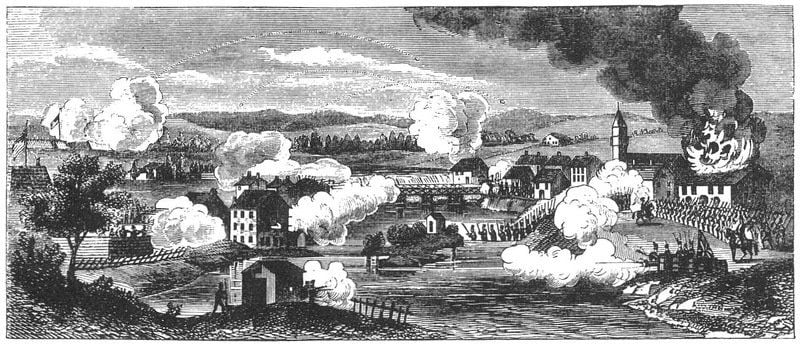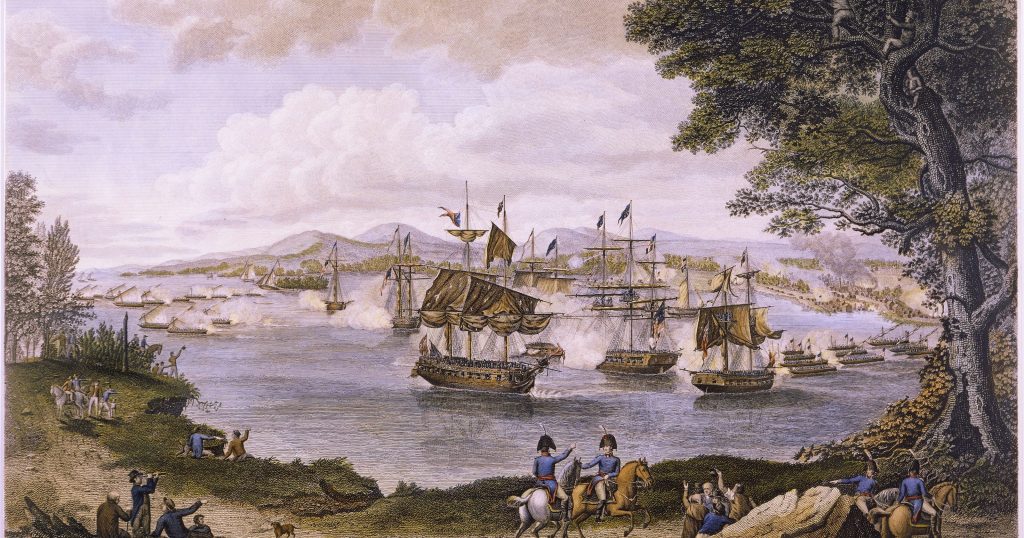The War of 1812 was a military conflict between the United States and the United Kingdom that lasted from 1812 to 1815. Here are the key details about this war:
Causes
- British trade restrictions and blockades
- The British Orders in Council restricted American trade with France, which was part of Britain’s broader economic warfare against Napoleonic France.
- The British enforced a policy of stopping and searching American merchant ships for British deserters, known as impressment, impressing thousands of American sailors into the Royal Navy against their will.
- The British Orders in Council restricted American trade with France, which was part of Britain’s broader economic warfare against Napoleonic France.
- Territorial disputes
- The U.S. accused Britain of violating American sovereignty by refusing to surrender western forts as promised after the Revolutionary War.
- Britain provided arms and support to Native American tribes resisting American expansion into the Northwest Territory, such as Tecumseh’s confederacy.
- Many Americans desired to expel the British presence from North America and expand U.S. borders northward into British Canada.
- The U.S. accused Britain of violating American sovereignty by refusing to surrender western forts as promised after the Revolutionary War.
Key Events
- The U.S. declared war on Britain on June 18, 1812, after failed attempts at economic coercion and diplomacy.
- Early American invasions of Canada in 1812 were unsuccessful, with defeats at Detroit and the Niagara peninsula.
- The U.S. had some success in 1813 with victories at the Battle of Lake Erie and the Battle of the Thames, regaining control of the Northwest.
- In 1814, with the defeat of Napoleon, Britain could allocate more forces, leading to the burning of Washington D.C. and the failed British invasion of Baltimore.
- Andrew Jackson’s victory at the Battle of New Orleans in January 1815 was the final major battle, occurring after the peace treaty was signed.
Outcome
- The Treaty of Ghent, signed in 1814 and ratified in 1815, ended the war in a stalemate, restoring relations between the U.S. and Britain to status quo ante bellum.
- No territory changed hands, but the U.S. enhanced its international credibility by surviving a war against Britain.
- The war increased American nationalism and led to the decline of the Federalist Party, which had opposed the conflict.
- Disputes over maritime rights and westward expansion that caused the war were left unresolved, sowing seeds for future conflicts.
The War of 1812 was fought by the young United States against the powerful British Empire primarily over maritime and trade issues, as well as territorial disputes arising from American expansionism clashing with British interests in North America. While a military stalemate, it helped forge a stronger sense of American national identity.
Battles
| List of War of 1812 battles |
| Chronological and theater-organized conflicts |
| Description | A comprehensive enumeration of battles from the War of 1812, arranged by date and location. |
| Conflict Period | 1812-1815 |
| Theaters of War | Organized into theaters where the battles occurred, highlighting the geographic and strategic diversity of the conflict. |
Here were some of the key battles of the War of 1812:
- Battle of Queenston Heights (October 1812)
This was one of the first major battles, where American forces invaded Upper Canada (modern-day Ontario) but were defeated by British and Canadian troops near Niagara Falls. - Battle of Lake Erie (September 1813)
A pivotal naval battle where American forces under Oliver Hazard Perry defeated and captured the British fleet on Lake Erie. This gave the U.S. control of the lake and cut British supply lines. - Battle of the Thames/Moraviantown (October 1813)
American forces led by William Henry Harrison defeated the British and their Native American allies, killing the Shawnee leader Tecumseh. This victory forced the British to abandon Detroit. - Battle of Lundy’s Lane (July 1814)
One of the bloodiest battles, it was a hard-fought draw near Niagara Falls between American forces invading Canada and British troops. High casualties forced the Americans to eventually withdraw back into the U.S. - Battle of Baltimore/Fort McHenry (September 1814)
The British attacked Baltimore, leading to the bombardment of Fort McHenry that inspired Francis Scott Key’s “The Star-Spangled Banner.” The successful defense helped turn public opinion against the war. - Battle of New Orleans (January 1815)
The final major battle was an overwhelming American victory led by Andrew Jackson, decisively defeating the British army outside New Orleans. It boosted U.S. confidence despite occurring after the peace treaty was signed.
Other notable battles mentioned include the Capture of Fort Erie, Battle of Chippawa, Burning of Washington D.C., and the Battle of Plattsburgh on Lake Champlain.
While a military stalemate overall, these key battles saw the U.S. hold its own against Britain and impact the course of the war, with victories boosting American confidence and morale despite the lack of major territorial changes.
Which battle was the most decisive in the War of 1812
The Battle of Lake Erie on September 10, 1813 is described as the most decisive battle of the War of 1812.
Several sources highlight the pivotal importance of this naval battle:
States that the Battle of Lake Erie, “also known as the Battle of Put-in-Bay, Ohio, was the pivotal naval battle, in which a squadron under the command of Captain Oliver Hazard Perry defeated the British squadron…giving the United States complete control of Lake Erie.”
Emphasizes that “Admiral Perry’s victory in the Battle of Lake Erie was a turning point in the War of 1812 and the development of the American empire. The American forces defeated the powerful British navy, demonstrating the growing international strength of the United States.”
The key reasons the Battle of Lake Erie is considered so decisive:
- It gave the United States control over Lake Erie, severing British supply lines to their forces in the west.
- With their supply line cut, the British were forced to abandon Detroit and Fort Amherstburg, ceding territory to the Americans.
- It enabled the subsequent American victory at the Battle of the Thames/Moraviantown, where Tecumseh was killed, breaking his Native American confederacy allied with the British.
- It demonstrated the U.S. Navy’s growing strength in defeating the powerful British naval forces on the lakes.
- It was a major turning point that shifted momentum in the war and the development of the American empire in the Northwest Territory.
While other battles like Baltimore, Plattsburgh, and New Orleans had significance, multiple sources directly cite the Battle of Lake Erie under Oliver Hazard Perry as the single most decisive engagement that turned the tide of the War of 1812 in America’s favor.
The Final Invasion: The Battle of Plattsburgh



Why The Battle of Plattsburgh is also considered the most decisive battle of the War of 1812 for the following reasons:
- It thwarted the major British invasion aimed at gaining control of the northern states and the Hudson River valley. As stated in , the victory at Plattsburgh “stunned the British government” and changed the course of peace negotiations in favor of the United States.
- With over 14,000 veteran British troops assembled, it represented the British’s largest commitment of forces and their best chance to decisively turn the war in their favor. As notes, it involved “the War’s largest concentration of British troops.”
- The decisive American victory at Plattsburgh denied the British the leverage to demand territorial concessions or control of the northern states based on their military position, as they had hoped. This preserved American sovereignty and territorial integrity.
- By repelling the massive British invasion, the Battle of Plattsburgh demonstrated the growing military capability and determination of the United States, enhancing its credibility as a nation able to defend itself against the powerful British forces.
- The victory boosted American morale and nationalism, as noted in , showing the young nation could prevail “against the finest army in the world at the time.”
While battles like Baltimore and New Orleans were significant, Plattsburgh represented the strategic turning point where American forces broke the ambitions of the largest British campaign of the war to gain control of the northern states. As such, it is considered the most decisive engagement in asserting American military prowess and sovereignty.